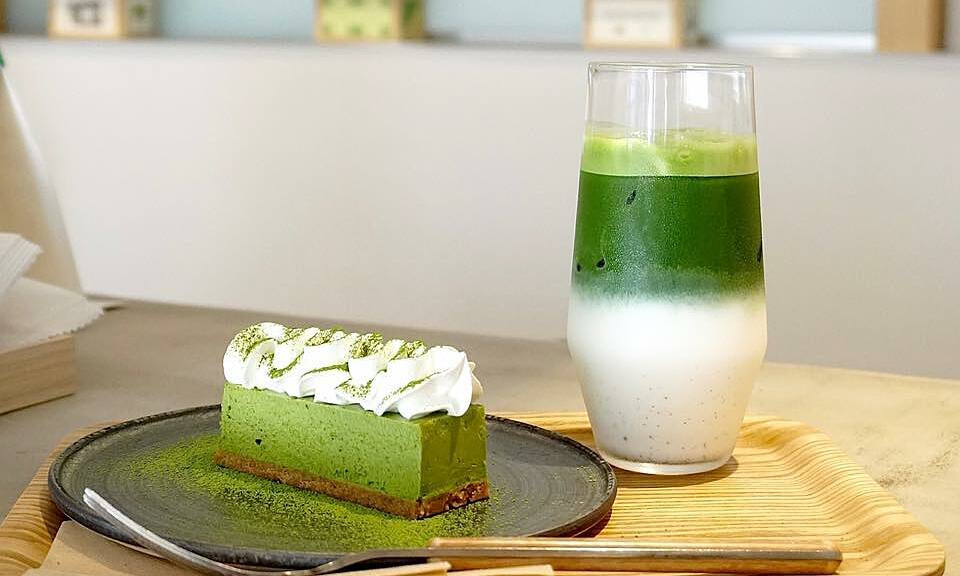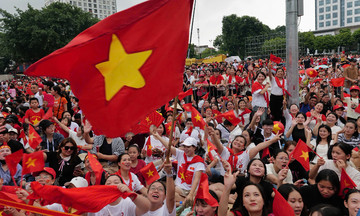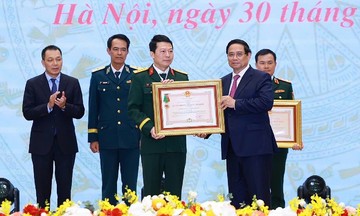After 30 years in advertising, Chitose Nagao opened a matcha cafe. She never imagined customers would line up every morning, mostly foreigners eager to try her matcha drinks.
The global matcha craze has tightened supply. However, Nagao's connection with Marukyu Koyamaen, a 300-year-old tea producer in Kyoto, gives her an advantage.
"When I heard their tea was piling up in storage during Covid, I wanted to do something," Nagao said about the partnership. Four years later, she has two cafes in Japan, one in Ho Chi Minh City, Vietnam, and another opening soon in Cebu, Philippines.
 |
Matcha Latte and Matcha Gateau at Chitose Nagao's cafe. Photo: Atelier Matcha Fanpage |
Matcha Latte and Matcha Gateau at Chitose Nagao's cafe. Photo: Atelier Matcha Fanpage
Matcha is a green tea powder made from tencha tea leaves. Japan has used matcha since the 12th century, primarily in elaborate tea ceremonies using small amounts of powder. But demand has surged recently, according to Reuters.
Millennials and Gen Z, seeking healthier choices, frequent trendy cafes worldwide for matcha lattes and desserts.
CNBC reports that this finely ground tea is valued for its antioxidants and higher caffeine content than other green teas. Its antioxidant richness has also gone viral on TikTok. The post-pandemic tourism boom further fuels demand, with matcha a popular souvenir for visitors to Japan.
Japan exported 36.4 billion yen (247 million USD) of green tea last year, four times the amount a decade ago, according to the Japanese Ministry of Finance. About 44% went to the US, mostly as matcha. This year, many online stores sold out as Americans stocked up before tariffs took effect.
At Kyoto's spring auction, tencha prices soared 170% compared to 2024, reaching 8,235 yen per kg, surpassing the 4,862 yen record set in 2016. Many retailers report matcha prices doubling in the past year. Buying even a small tin is increasingly difficult, even in Tokyo. Some shops limit purchases to ensure supply and prevent hoarding.
Regarding supply, the Japan Tea Manufacturers Association reported 5,336 tons of tencha produced in 2024, nearly 2.7 times the amount a decade prior, as more farmers switched to tencha. However, producers and businesses predict lower matcha output this year due to record summer heat.
Marc Falzon, a tea buyer from Uji, Japan, for Ooika, a milling company in New Jersey, US, said many hoped for a higher yield this year to ease the shortage, but that may not happen.
Kaminari Issa, selling everything from matcha beer to matcha cakes at four Tokyo stores in the Asakusa district, says receiving email requests for a ton of matcha is not uncommon. Miku Sugawara, a shop manager, expressed excitement but acknowledged limited supply. Sugawara also worries that record heat could reduce next year's tea yield and further increase prices.
Japanese producers are trying to increase matcha production, but this won't immediately address the shortage, as new tea fields take five years to yield. "I suspect we will see matcha prices climb even further," Falzon said.
Competition for matcha is so fierce that Ito En, the world's largest bottled green tea seller, established a dedicated matcha division in May. The company forecasts an 11% increase in exports this year and is raising prices by 50% to 100% on some products due to rising raw material and labor costs.
The Japanese government is considering subsidies to encourage farmers to grow more tencha. However, tencha cultivation is labor-intensive, as the buds must be shielded from sunlight for their characteristic flavor.
Producers say there aren't enough workers to harvest, steam, and dry the leaves before grinding. "Matcha’s level of popularity is astounding. Our factories and all our contractors are overloaded," said Yasutaka Yokomichi, head of Ito En's matcha division.
It often takes an hour to grind just 40 grams of matcha, as heat from faster grinding can degrade the powder. Ito En is prioritizing investment in more grinders and packaging equipment.
Ito En has contracts with farmers for 7,000 tons of regular green tea annually, but only about 600 tons of tencha. They say it's hard to convince farmers to grow more tencha because many fear the matcha craze will fade.
Phien An (CNBC, Reuters)












